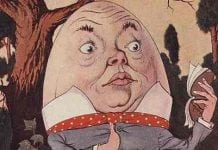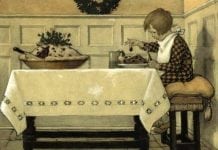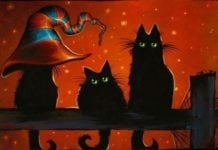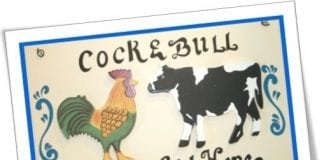Little Miss Muffet
Sat on a tuffet
Eating her curds and whey.
Along came a spider
That sat down beside her
And frightened Miss Muffet away.
Arachnopohobia is clearly not a modern complaint. Although cobwebs have traditionally been used as a dressing for wounds (and, scientifically tested, have turned out to contain all kinds of antibiotics), spiders have long been seen as malevolent.
Richard III, presented by William Shakespeare as the most evil English king, is described as ‘a bottled spider’, which comes from the belief that spiders were inherently toxic – if one were dropped into a glass of water, every drop would be poisoned.
It is therefore entirely understandable that this particular little girl from days gone by would have been frightened away by one, but in fact there’s more to the origins of this rhyme …

‘Little Miss Muffet’ first appeared in print in Scotland in 1805, but it was probably around for a long time before that. Some Scottish historians believe Miss Muffet to be Mary, Queen of Scots (1542–87), and the spider John Knox (c.1510–72), the great Protestant reformer and founder of the powerful Presbyterian Church in Scotland.
Knox’s best-known work was The First Blast of the Trumpet Against the Monstrous Regiment of Women (1558) – a notorious attack against the female Roman Catholic sovereigns of the day, in particular Mary I of Scotland and Mary I of England, in which he stated that his purpose was to demonstrate ‘how abominable before God is the Empire or Rule of a wicked woman, yea, of a traiteresse and bastard’.
Which goes some way to explaining why he and the young queen were unlikely to see eye to eye, even if she hadn’t had such a turbulent and very public love life – twice married, to the French Dauphin (Francis II) and Lord Darnley, both Catholics, and with a purported lover, David Rizzio, murdered by a jealous Darnley.
Knox held vast religious influence in Scotland and regularly rebuked Mary, often openly attacking her in his sermons. Eventually her nobles rebelled and she ran away to England, but her cousin Elizabeth turned out to be even less keen on her presences than Knox.
Mary was kept under house arrest for nineteen years and then executed. So the Scottish line is that only if Miss Muffet had made friends with the spider, everything could have been so different for her – and for spiders too for that matter.
However, an English interpretation of the rhyme is rather more domestic in nature. Historians point to the eminent English physician Dr Thomas Muffet (1553–1604), staunchly Puritan in his beliefs and therefore close in spirit to John Knox.
What he is best known for is his study of insects, particularly spiders, and how they relate to medicine.
Hence it is easy to imagine one of Dr Muffet’s daughters sitting on a small, three-legged stool (a tuffet), eating her curds and whey (a dairy product, not unlike cottage cheese), when one of his spiders dropped in and frightened the living curds out of her. – Albert Jack
Albert Jack AUDIOBOOKS available for download here
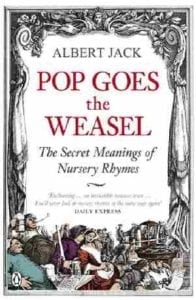
Pop Goes the Weasel – Nursery Rhyme History



